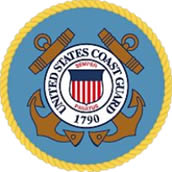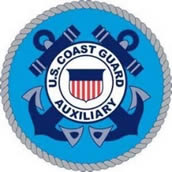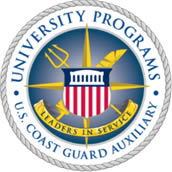Since 1790, the Coast Guard has safeguarded the American people and promoted national security, border security, and economic prosperity in a complex and evolving maritime environment. The Coast Guard saves those in peril and protects the Nation from all maritime threats.
As a branch of the U.S. Armed Forces, a law enforcement organization, a regulatory agency, a member of the U.S. Intelligence Community, and a first responder, the Coast Guard employs a unique mix of authorities, broad jurisdiction, flexible operational capabilities, and a network of partnerships. The Coast Guard is the principal Federal agency responsible for maritime safety, security, and environmental stewardship in U.S. ports and inland waterways, along more than 95,000 miles of U.S. coastline, throughout the 4.5 million square miles of U.S. Exclusive Economic Zone (EEZ), and on the high seas.
The over 50,000 members of the Coast Guard operate a multi-mission, interoperable fleet of 259 Cutters, 200 fixed and rotary-wing aircraft, and over 1,600 boats. Operational control of surface and air assets is vested in two Coast Guard geographical Areas (Pacific and Atlantic), nine Coast Guard Districts, and 37 Sectors located at strategic ports throughout the country. Five Mission Support Logistics and Service Centers provide services for operational assets and shore facilities. Coast Guard program oversight, policy development, and personnel administration are carried out at Coast Guard Headquarters located on the St. Elizabeths campus in Washington, DC.
Maine Maritime Academy supports two paths to commissioning in the Coast Guard as well as students who chose to serve as enlisted members while actively attending school. For those interested in learning more contact LCDR Kelly Gualtieri at kelly.gualtieri@mma.edu or 207-326-2245.
Graduates of Maine Maritime Academy are excellent officer candidates for the Coast Guard. Your specialized maritime training, business skills, knowledge of vessel management and operations, licenses as U.S. Merchant Marine Officers (deck and engine), environmental stewardship expertise, and emergency management certifications all position you for success.
 The MARGRAD program “seeks to commission maritime academy graduates into critical service need specialties appropriate to their training and experience. Traditionally, the service needs most commonly filled by maritime academy graduates have been assignments in the prevention mission community. Prevention officers execute the CG’s Prevention Program, consisting of maritime safety, security, waterways management and mobility, and environmental stewardship. The Prevention Directorate includes policy experts in waterways management, navigation safety, boating, commercial vessels, ports and facilities, merchant mariner credentialing, vessel documentation, marine casualty investigation, inspection, and port state control.”
The MARGRAD program “seeks to commission maritime academy graduates into critical service need specialties appropriate to their training and experience. Traditionally, the service needs most commonly filled by maritime academy graduates have been assignments in the prevention mission community. Prevention officers execute the CG’s Prevention Program, consisting of maritime safety, security, waterways management and mobility, and environmental stewardship. The Prevention Directorate includes policy experts in waterways management, navigation safety, boating, commercial vessels, ports and facilities, merchant mariner credentialing, vessel documentation, marine casualty investigation, inspection, and port state control.”
MARGRAD officers have also been assigned to a broad spectrum of Coast Guard mission communities, both afloat and ashore.
Initial Assignment and Initial Training
MARGRADs work with a Coast Guard assignment officer following selection. The assignment officer will:
- Review your educational background;
- Assess your experience and qualifications;
- Review your expressed assignment interests;
- Assign orders to a position at a Coast Guard field unit.
Following commissioning (which occurs approximately 30 days prior to attending the Direct Commission Officer (DCO) course in New London, Connecticut) new officers will execute permanent change of station (PCS) orders and report directly to their first unit for a brief period. MARGRADs will then go TDY to the DCO course. The DCO course will be 4-5 weeks in duration (MARGRAD officers with previous commissioned service who have previously attended a commissioning course will attend a 4-week course, all others will attend a 5-week course). At DCO training, MARGRADs receive initial indoctrination to the traditions and programs of the service, and training on service-specific administration essentials needed for their success as a commissioned officer in the Coast Guard. Following the completion of DCO training, MARGRADs will return to their unit.
Initial Assignment Details
Prevention Community: An initial assignment in the prevention community is typically manifested at a Training Port- typically a Coast Guard Sector, working as an apprentice within the inspection division of the Sector Prevention Department. Several Marine Safety Units are also Training Ports and may be available for a MARGRAD officer’s initial assignment. A MARGRAD officer reporting to the inspections division will focus on obtaining competencies by completing Performance Qualification Standards (PQS) with on-the-job training, under the supervision of a qualified Journeymen Marine Inspector and through various online and non-resident courses.
Vessel Inspections: Vessel Inspectors ensure regulatory compliance with all aspects of national and international regulations for U. S. and foreign flag commercial vessels operating in U.S. waters. Vessel Inspectors make up the largest population the of Prevention program. Assignment to a Vessel Inspections Division at a Sector is most common for new MARGRAD Prevention officers.
Note: MARGRAD officers may receive instead an initial assignment to an afloat unit, sector response, etc.
Career Path
Follow-on assignments may include an additional tour as a Prevention Division Chief in Vessel Inspections, Investigations or Waterways Management, graduate school, training programs, staff tours at a Coast Guard Area or District, or as a Headquarters program manager.
Each assignment brings additional levels of authority, rank, tenure, and responsibility. A full career in the Coast Guard’s Prevention Program can lead to a senior officer’s position as an Officer-In-Charge of Marine Inspection (OCMI), Captain of the Port (COTP), Federal on Scene Coordinator (FOSC) and Federal Maritime Security Coordinator (FMSC), within one of the Sector Commander positions at ports in and outside the continental U.S.
Other positions may be assigned to a second-tour MARGRAD officer.
Marine Investigations: Marine Investigators investigate marine casualties, mariner misconduct, and (un)suitability to hold a Merchant Mariner Credential. Marine Investigators collect the facts of a marine incident/casualty, determine the causal factors of the occurrence, and if misconduct, negligence, or incompetence is found leading to the occurrence of the casualty. They can then recommend if a civil penalty, or suspension and revocation hearing be held, or if lessons learned can be used to amend vessel safety regulations to prevent casualty recurrence.
Waterways Management: Management of aids to navigation (ATON), safety and security zones, regulated navigation areas, ice breaking, vessel traffic system, port waterways management, and the automatic vessel identification system.
MARGRAD Terms of Service and Appointment Grade
Once commissioned, you will receive a three-year Extended Active Duty (EAD) contract. The selection panel determines the appointment grade of each new officer.
Selectees will receive a commission as an:
- Ensign (O1)
- Lieutenant (j.g.) (O-2)
- LTJG may be offered to selectees depending on the applicant’s training, experience, qualifications, and potential for future advancement.
Officer Candidate School (OCS): Coast Guard Commission
If you are a civilian or current enlisted member of the Coast Guard and would like to advance your leadership, you may apply for selection as an Officer Candidate.
Officer Candidate School (OCS) is a highly specialized, 17-week course of instruction in leadership, management, navigation, law enforcement, and military subjects. OCS classes are convened twice a year, in January and in the summer.
Upon completing the 17 weeks of training, OCS graduates will be expected to successfully lead CG enlisted members in the execution of CG missions.
As an OCS applicant, please evaluate your leadership experience, as well as project and budget management skills, to ensure that you are ready to meet the challenge. This is an extremely competitive process. The Coast Guard is looking for individuals who have demonstrated the potential to become exceptional leaders.
Individuals who successfully complete Officer Candidate School are commissioned as ensigns (O-1) (note that CG CWOs may be eligible for commissioning as O-2s) in the United States Coast Guard.
U.S. Coast Guard Auxiliary:
The U.S. Coast Guard Auxiliary (Auxiliary) is the uniformed, civilian, volunteer, non-military component of the Team Coast Guard, created by an act of Congress in 1939. Members of the Auxiliary directly support the U.S. Coast Guard (Coast Guard) in all it missions except military and direct law enforcement actions.
 The primary focus of the Auxiliary is on recreational boating safety. This is accomplished across several mission areas including, courtesy vessel safety checks, public education courses, public affairs and supporting marine-focused retailers with educating their customers. Members of the Auxiliary also act as force-multipliers with surface operations such as on-the-water safety patrols, and augmenting active-duty small boat stations in support of training and search and rescue efforts. The Auxiliary also supports other important Coast Guard operational missions such as; maritime environmental protection and response, aids to navigation verification, and radio watchstanding at active-duty stations. In addition there are physicians and nurses who provide health services support to Coast Guard clinics and others gain qualifications as culinary service specialists, who support active-duty Coast Guard units.
The primary focus of the Auxiliary is on recreational boating safety. This is accomplished across several mission areas including, courtesy vessel safety checks, public education courses, public affairs and supporting marine-focused retailers with educating their customers. Members of the Auxiliary also act as force-multipliers with surface operations such as on-the-water safety patrols, and augmenting active-duty small boat stations in support of training and search and rescue efforts. The Auxiliary also supports other important Coast Guard operational missions such as; maritime environmental protection and response, aids to navigation verification, and radio watchstanding at active-duty stations. In addition there are physicians and nurses who provide health services support to Coast Guard clinics and others gain qualifications as culinary service specialists, who support active-duty Coast Guard units.
These are just some of the many mission areas that Auxiliarists volunteer their time and experience in support of the Coast Guard. With approximately 25,000 members, the Auxiliary is a true force multiplier for Team Coast Guard.
Auxiliary University Program:
 With the growing need to enhance the continuous flow of high quality officer candidates for commissioning into the Coast Guard, outside the Coast Guard Academy, the Auxiliary, working with the Coast Guard, established the Auxiliary University Program (AUP) in 2007.
With the growing need to enhance the continuous flow of high quality officer candidates for commissioning into the Coast Guard, outside the Coast Guard Academy, the Auxiliary, working with the Coast Guard, established the Auxiliary University Program (AUP) in 2007.
The first units were established at Auburn University, The Citadel – The Military College of South Carolina, and The College of William & Mary. As of the end of the 2021 academic year, there were approximately 175 students, representing 39 schools across the United States. Of these, there were 14 “stand alone” AUP units.
Purpose:
The primary role of the AUP is to develop “Leaders in Service”. With no Reserve Officer Training Corps (ROTC) program within the Coast Guard, the AUP serves as a pathway for students to enter into Coast Guard officer roles through Officer Candidate School, Direct Commissioning, or the Maritime Academy Graduates program (MARGRAD) route. As members of the Auxiliary, they are part of Team Coast Guard. As a result, their efforts support the missions of the Coast Guard, in a volunteer capacity.
By providing the students with a program of study that exposes them to Coast Guard and Auxiliary training, as well as qualifications, internships with Coast Guard units, and leadership development opportunities, the AUP serves to expand the student’s academic experience with membership in a premier volunteer organization, while gaining practical, real-world experiences.
Nationally, over the history of the program, AUP graduates have acceptance rates of over 70% for Officer Candidate School vs 3% for nonaffiliated individuals applying.
While not all AUP graduates seek to obtain a commission in the Coast Guard, many go into the Federal Emergency Management Agency, the Department of Homeland Security, the Department of Defense, as well as a variety of emergency services, engineering, environmental and marine sciences fields.
Regardless of the student’s career goals, time spent as a member of the Auxiliary, and the AUP, can only serve to strengthen their resume and increase their opportunities post-graduation.








All Rights Reserved © 2026 • Web issue?
Non-Discrimination Notice • Privacy Policy & GDPR